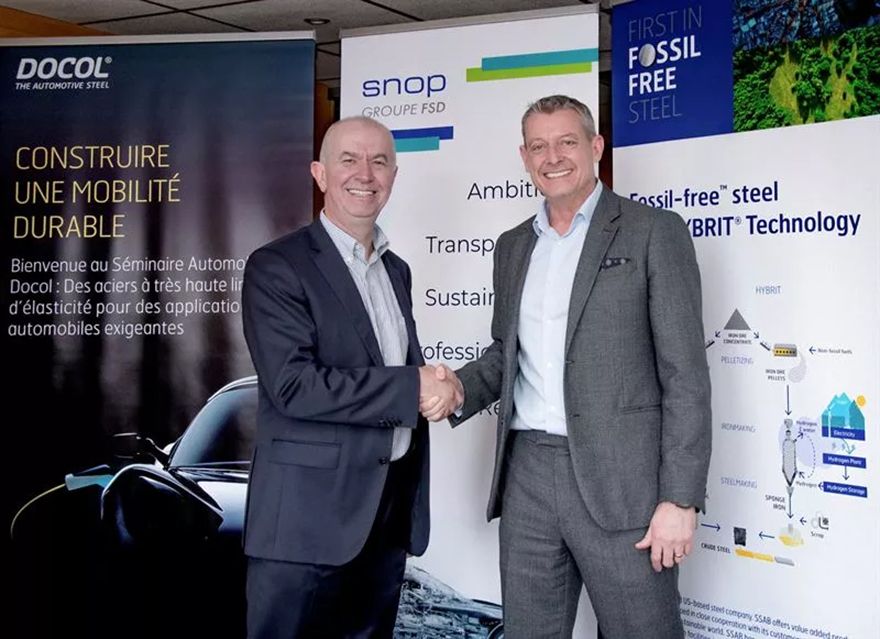 Photo: Hervé Daenens, vice president operations at Snop and Tony Harris, head of sales and business development, at SSAB Europe
Photo: Hervé Daenens, vice president operations at Snop and Tony Harris, head of sales and business development, at SSAB EuropeSteelmaker
SSAB and Tier One automotive supplier
Snop have entered into a long-term partnership for future deliveries of fossil-free steel. The partnership will help Snop to reduce the CO
2 footprint of its products and to meet its target to reduce emissions by 30% by 2030.
The Groupe Financière SNOP Dunois (FSD) is a privately-owned automotive supplier with established relationships with all European OEMs. The group has three divisions (Snop, Smom and Balconi) and employs over 8,200 people in 12 countries at its 36 production sites and four technical centres. Groupe FSD offers its customers a broad product portfolio, supplying body structure stampings, roll-formed parts and assemblies for cars and commercial vehicles, as well as stamping dies and automatic presses.
Pierre Mainguy, Snop’s purchasing director, said: “We are delighted to have signed this agreement with our partner SSAB. Achieving our objective of reducing our CO
2 emissions by 30% before 2030, and to be ‘net zero’ in 2050, is a must for us, for our industry, and for the preservation of our planet. We know that to achieve it, we can count on SSAB, which is a major player in the decarbonisation of the steel industry.”
Sustainability goalsHuy Nguyen, SSAB Europe’s sales director, said: “We are pleased to support Snop’s sustainability goals in the automotive industry in delivering the tough CO
2 reductions that both producers and consumers require for more sustainable cars. The virtually fossil emission-free steel we produce retains its high quality, but its climate impact is significantly lower compared to steel based on traditional blast furnace technology. This helps to reduce our customers’ carbon footprint and provides a competitive advantage in the market.”
This agreement marks a new step in the long-standing partnership between Snop and SSAB that comprises a variety of actions addressing all aspects of the development chain, from sales to production to testing and customer experience as an example of inter-company cooperation in the world of steel products.
Traditional steel production represents a significant source of global CO
2 emissions, By changing the way steel is produced, SSAB wants to cut emissions and create a fossil-free value chain with customers and partners, regardless of whether the raw material is scrap or iron ore.
In 2021, SSAB produced the world’s first fossil-free steel as a proof of concept using HYBRIT, a revolutionary steelmaking technology which uses hydrogen reduced sponge iron to remove the primary source of CO
2 emissions with water as a by-product, instead of CO
2. Since then, a number of pilot deliveries have been made to customers in different industries. When available in commercial volumes, the fossil carbon emissions in SSAB’s production of SSAB Fossil-free steel are targeted to be less than 0.05kg CO
2e/kg steel in Scope 1, 2 and for iron ore upstream Scope 3, of the GHG Protocol.